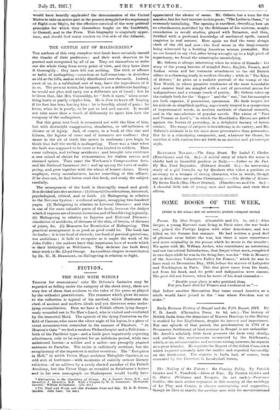FICTION.
THE MAID WITH WINGff.f
Trrottou for convenience' sake Mr. Onhorn's fantasies may be regarded as -falling under the category of the short story, there are very few of them that conform to the rules of the game as played by the orthodox .practitioners. The romance which -gives its name to the collection is typical of his method, which illustrates the clash of ancient and modern ideals and yet discovers some under- iying.reconeiliation. Here we have a British officer, lying danger- ously wounded out in No:Mati's-Land, who is visited and comforted by the immortaIMaid. The episode of the dying Centurion on the field of Connaeawho saves the silver eagle of his legion, is a piece of vivid reconstruction somewhat in the manner of Flaubert. "At Heaven's Gate " we find a modern Philanthropist and a Politician- -both of the Pacificist type—and a futile poet impatiently expecting arbinittance, only to be rejooted- for an indefinite period, while two unlettered heroes—a soldier and a sailor—are promptly granted entrance to Paradise. The satire is sufficiently mordant, but the 'complacency of the impeators is rather overdone. The " Reception is Hell," in which Victor Hugo acclaims Thaophile Cautier,is on odd sort of burlesque--with.momenta of entirely serious literary criticism—of-an address by a newly elected member of the French Academy, but the Victor Hugo as revealed in Swinhurne's letters and in his own monograph -on Shakespeare would hardly have "• ifolinoolog, or She Si71114Cii011 of Dinars. By A. Dansett Jeers, WM., and Llewellyn J. Llewellyn, M.B. With a Chapter by W.11. Beaumont. illustrated. Landon: SYfudxm Beinsmann. l255. net) The Mad wan 4Sitwn nod akar Fantasies Crave sad Rath By -IL B. worn. ,leadeo: John .Lase. Ira. 551.1 .appreeiated the 'choice of -wane. 'Mr. Osborn has a turn 'for the macabre, butdsis best venture in this genre, "The Ladies in Green," is extremelytentaliaing. The opening is excellent, describing-how an excehooltratater,mertified by the fickleness of his mistress, 'sought consolation in occult studies, played with Satanism, and -then, fortified with a profound knowledge of mediaeval BMUS, turned magician in real earnest. Hero again we find the same abrupt cloth of the old and now—the final scene in the tragicomedy being witnessed by a hustling American woman journalist. But we are bound to say that;after heing-arought up to a high pitch of expectancy, we found the catastrophe unsatisfying.
'Mr. Osborn is always interesting when he writes of Canada hie story of the young heroine of mingled Scots, English, French, and Indian strain and her romantic attachment to the old British officer is a charmingstudy in modern chivalry ; white in " The King of Hoboes " he gives ue a realistic portrait of the tramp of the New World, in whom parasitic tendencies of the most formidable and sinister kind are mingled with a sort of perverted genim.for independence and a strange touch of poetry. Mr. Osborn takes up the cudgels both for the " flapper " and the " nut," but his examples are both superior, if precocious, specimens. He finds trirgeta for his ridicule in simplified spelling, ingeniously treated in a symposium of impersonated words, in modern methods of classical research, and in the manufacture of popular novels. The vision of "Post and Present at Lord's," in which the Hambledon Eleven arepittial againat the heroes of yesterday, .is a delightful fantasy .of 'heroic cricket. Tho range of subjects is bewildering in ite.variety, and'Mr. Osborn's attitude is in the main more provocative than persuasive. But he is a stimulating companion, and, whatever his theme, he enriches it with curious lore-set forth in-an incisive and picturespie style.


























 Previous page
Previous page